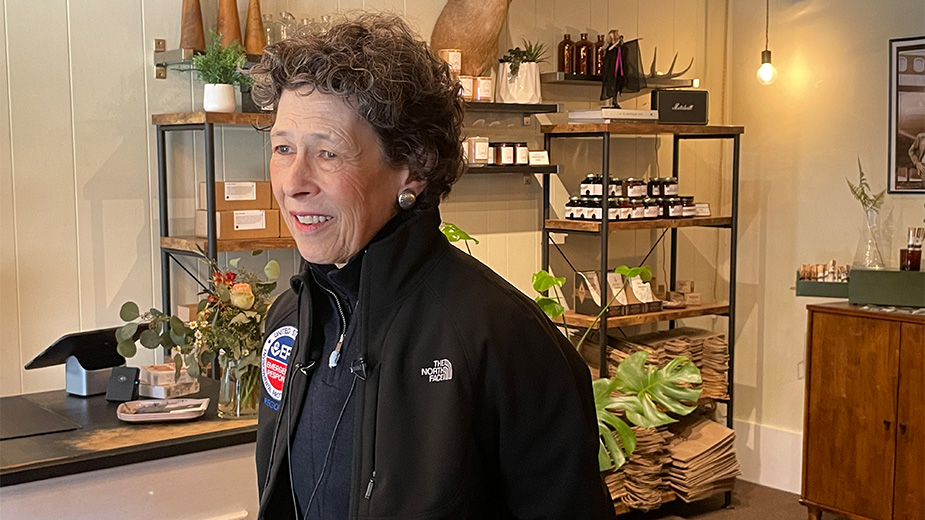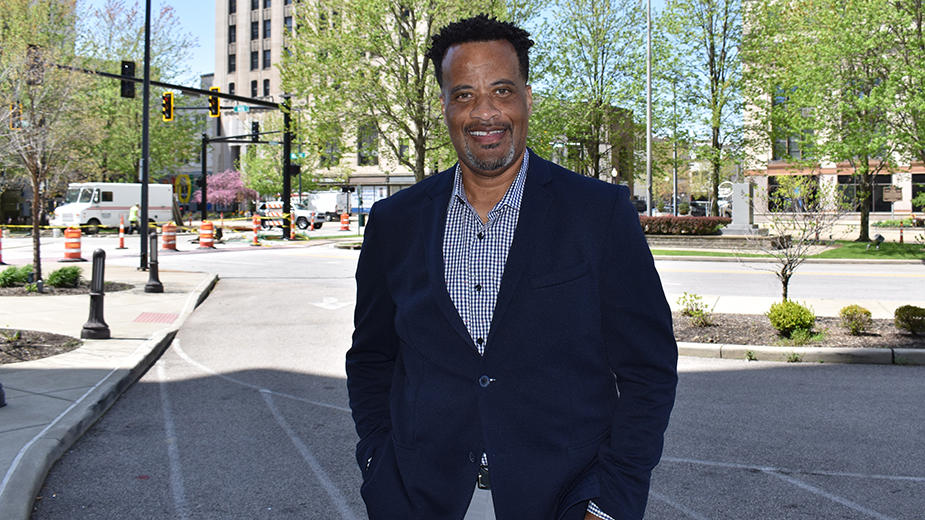Sen. Brown Still Angry About Controlled Explosion in East Palestine
EAST PALESTINE, Ohio – U.S. Sen. Sherrod Brown returned to the village Monday, still angered over testimony last week by Jennifer Homendy, chair of the National Transportation Safety Board, who said their investigation had determined the controlled vent and burn of five railcars containing vinyl chloride may not have been necessary.
After the Norfolk Southern train derailment in East Palestine on Feb. 3, 2023, the controlled explosion was conducted Feb. 6, and at the time it was believed necessary to avoid a possible catastrophic explosion.
After Homendy’s testimony last week, Brown, D-Ohio, released a statement calling it “outrageous” and “more proof that Norfolk Southern put profits over safety and cannot be trusted.”
Standing in the 1820 House Candles shop in downtown East Palestine on Monday, Brown again blamed Norfolk Southern for the decision, stating it moved too fast and pushed without complete information, which led to the unnecessary burn and additional contamination entering the air.
Brown said there should be a lot of anger at Norfolk Southern for several issues prior to the derailment, including the layoffs of railroad workers, executives getting bonuses and big stock buybacks and the weakening of safety rules, including track inspections and heat detectors.
“We’ve got to make sure that Norfolk Southern continues to monitor and test people for as long as they think that they need it,” said Brown, adding he saw people with rashes and burns early on after the derailment and now it is important to know what this will do to them down the road.

Debra Shore, U.S. Environmental Protection Agency Region Five administrator, said officials are eagerly awaiting the final report from the NTSB investigation of the derailment, which is scheduled to be released June 25. The EPA had coordinators on the scene within hours of the derailment, setting up air monitoring around the fiery train crash site and then the evacuation zone.
Shore said although the federal EPA had people in the room when the decision for the controlled vent and burn was made, they were consulted only about the air monitoring that would be needed and not about whether it was the right decision. She said their opinion was not requested.
“At that time, the incident commander was the local fire chief working with the Ohio EPA and Norfolk Southern,” Shore said. “That’s who made the decision, and I can’t second guess it because our folks weren’t privy to all the information that they were.”
Mark Durno, the EPA District Five On-Site coordinator, said Monday that Norfolk Southern had a contractor, an operational expert on scene in the days following the derailment. He said the expert checks the tank cars for temperature issues and whether an extreme measure like a vent and burn should be taken. If there were other contractors at the scene, like the ones reportedly there from Oxy Vinyls who believed the tank cars were actually cooling, as Homendy said during her testimony, he was not aware of them, Durno said.
For those in East Palestine clamoring about a long-term need for testing of the air, soil, water and health of residents unrelated to the contractors provided by Norfolk Southern and the EPA, six studies have been approved for funding.
Studies
Shore pointed to President Joe Biden’s mid-February visit when he announced the six grants through the National Institutes of Environment Health, which will address different aspects of long-term health monitoring.
“I’m pleased to have heard that, and I know that these studies will be conducted in a collaborative fashion, but they have different focuses,” said Shore, who released more information about the studies Monday.
One study, the East Palestine Community-Engaged Environmental Exposure, Health Data and Biospecimen Bank, conducted through the University of Pittsburgh, will collect blood and urine samples from 300 residents and take air and well water samples from 100 homes. Those will then be followed up with additional environmental sampling every year or two years and annual analysis to look at any liver damage.
A second study through the University of Pittsburgh, the Profiling the Post-accident Exposome in East Palestine study, would collect 75 evenly distributed soil, water and sediment samples and look at a long list of combustion byproducts. The study would include nearby Beaver and Columbiana counties. Then the study would look at possible long-term environmental and human health risks.
A University of California San Diego study will look at the short-term public health impact of the derailment, examining the effects of mixed toxin exposure with the residents of East Palestine following the derailment and using the researchers’ expertise on Gulf War burn pits and the health symptoms and illness those can cause.
Another study through the University of Kentucky will use an online survey to track the physical and mental concerns of residents since the derailment and help enhance communication among the agencies and researchers studying the situation and the community.
A Texas A&M University study would look at the air samples that were taken, whether or not monitoring approaches missed potential exposures and the symptoms of East Palestine residents when it comes to both physical and mental health, along with unique chemical sensitivities.
A sixth study through Case Western Reserve University will look at East Palestine and the surrounding area, examining DNA sequence mutations compared with baseline exposures and forming a community advisory board.
Shore said the federal EPA continues to push for a settlement with Norfolk Southern that would include payment for long-term testing of water, soil, air and public health. Additionally, the Ohio and Pennsylvania attorneys general have filed lawsuits, as well as many residents, which Shore said she believes are warranted.
Legislation
During what he called his ninth trip to East Palestine since the derailment, Brown vowed to continue returning until everything is done. He said he wants to see reimbursement for the health departments and the EPA, because he says local taxpayers should not be paying for this.
Brown said he was able to get a small change in a larger tax bill that, if passed and signed into law, would not require East Palestine residents to pay IRS taxes on the $1,000 inconvenience checks they received from Norfolk Southern or the lost wage reimbursement. Brown said the U.S. House passed the bill containing the language he had inserted in it, and it now heads to the Senate.
“Nobody should get hit with a tax bill. It’s nobody’s fault – it just happened because those kinds of dollars coming from a company like Norfolk Southern are taxable,” Brown said.
Another piece of legislation, the bipartisan Railway Safety Act of 2023, pushed by both Brown and U.S. Sen. J.D. Vance, R-Ohio, has been stalled, and Brown blames railroads and railroad lobbyists. The legislation would enhance safety procedures for trains carrying hazardous materials and establish requirements for wayside defect detectors aimed at catching a problem before it reaches a critical level – like the train in East Palestine. It would also require at least two-person crews and increase fines for railroads found in violation and responsible for accidents.
Brown said the railroads are pushing for only one person on a train like the one that came through East Palestine with 150 cars on the night of the derailment 13 months ago.
“Ohio has the third most miles of track of any state in the country,” Brown said, behind only Texas and Illinois. “I want to make sure these trains are safer. These derailments shouldn’t happen with the frequency that they do. The governor and every community ought to know when a train is going through what’s on that train and if there’s hazardous materials.”
Contaminants
According to the EPA, all the contaminated soil was removed in October, though site characterization samples continue to be taken to make certain all the contaminants were removed. Work on the Sulphur Run and Leslie Run streams will continue through at least midsummer, especially Sulphur Run where an oily sheen has been determined to have come from lube oil and possible legacy contaminants. One culvert in Sulphur Run still needs to be cleaned.
“I think residents have reasons to feel confident that contaminants have been removed,” Shore said, adding people should not be going into the posted streams until that cleanup is completed.
From air monitoring in the cabs of equipment on the actual derailment site to the Trace Atmospheric Gas Analyzer bus that drove around the derailment area and community, Shore said there have been so many nondetects that many of the earlier precautionary testing methods have now been reduced. Additionally, there were no detections during stream remediation work completed so far.
While there were some elevated levels early on of some chemicals, Durno said none were above the levels for health concerns. For instance, he said the levels of butyl acrylate detected were below the levels of public health concerns, but the odor from the chemical was so strong inside some homes that people could not stand to be inside them.
Durno said he expects there will be long-term private monitoring of groundwater, including municipal and private wells.
Pictured at top: U.S. Sen. Sherrod Brown visited East Palestine on Monday.
Copyright 2024 The Business Journal, Youngstown, Ohio.



